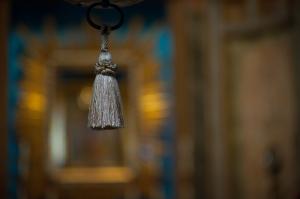
Back at her home, Chaviva quickly changed out of her wet clothes into a fresh, dry set. She put the new robes over her undergarments and veiled her face. Placing the hood over her head, she turned to look at her niece.
“Perfect!” squealed Leah. “No one will recognize you. Come on!”
They made their way down the dirt path, beaten firm from hundreds of years of travelers, Leah tightly gripping her hand. They heard the crowds before they saw them, and Chaviva turned to go back.
“No, sweet girl, I can’t! All the people—if they even touch my robes—I can’t do it.”
Undaunted, Leah pressed on, dragging her aunt behind as they went back down toward the sea. A great mass of people had gathered, all pushing forward to get a glimpse of the rabbi from Nazareth. Darting her way through, Leah somehow got them to the center, and there he stood.
Chaviva’s heart skipped a beat.
What had she expected? A great warrior, a man of tall stature, broad in chest and booming in voice; a man who would single-handedly take down the Roman Empire and release the Jews from their oppression. But this man? Average in every way. Thick dark hair on his head and face, modest in clothing and meager in possessions. But something about him captivated her. He carried an authority that she couldn’t understand. When he spoke, people leaned in, hanging on every word.
Suddenly, a great shout parted the crowd. Jairus, the leader of the synagogue several towns over, rushed toward Jesus and fell at His feet.
“Rabboni,” he pleaded, “Rabboni, you must come to my house! My only daughter, the treasure of my heart, lies dying. Please, Rabboni, my baby—barely twelve-years-old. Please come and put your hands on her so she can live.” [Mark 5:22–23]
Jesus reached down to help Jairus to his feet, and they hurried off.
Chaviva froze. Should she follow? Should she stay? The crowd, surging forward and propelling her along, decided for her. Someone wrenched her niece’s hand from her own, but she barely noticed.
A fresh wave of determination washed over the woman. Jairus wanted Jesus to place his hands on his daughter. If only she could touch his robes, she thought, she knew she would find healing.
Calling on her deepest reserves of strength, she elbowed and pushed her way through the mass of people. With every step, she prayed. Forgive me, Father. I’ll give twice the necessary sacrifices and offerings. There he was, only a few feet away. If she could only…reach…the fringe…
Her fist clutched the tassel at the corner of His outer garment. With a gasp, she dropped it and clutched her chest.
Something had happened.
Chaviva’s heart hammered in her ears. A warmth spread through her, starting in her hand and quickly making its way to her abdomen, and then the rest of her body. She looked around wildly, then gingerly pushed her stomach—no pain. She pushed harder—still nothing. The familiar wetness seemed to have dried up.
Looking up, she saw that the crowd had stopped. Jesus had turned around, his dark brown eyes scanning the sea of faces.
“Who touched my clothes?” He called out.
The people looked around at each other and then back at Jesus, murmuring their denial and shaking their heads.
One of his followers said, “Master, you see the crowd pressing against you and you say, ‘Who touched me?’” [Luke 8:45]
Jesus cut him off. “Someone touched me,” he insisted, “I know that power has gone out from me.”
A hush fell over the people and time seemed to stop. The hammering of Chaviva’s heart grew louder and louder until she feared it would burst out of her chest.
She stared at her feet for what felt like an eternity, then slowly raised her head to see Jesus looking at her in a way that penetrated into her very soul. She looked around quickly for an escape route, but the crowd prevented her from moving. Trembling violently, she stepped forward; one small step after another until she fell, helpless and ashamed, at his feet.
“Have mercy, my Lord,” she whispered. “Forgive me, Lord!”
Jesus nodded at one of the men, and they helped her up.
“Speak, child. Why did you touch my robe? What did you hope to do?”
Chaviva tried to swallow, but her parched throat wouldn’t cooperate. She would not live to enjoy her healing because the people would surely have her killed.
She took a deep breath, looked Jesus in the eye, and told him everything.
“Twelve years, my Lord,” she said. “Twelve years have I suffered from bleeding, unable to live with my family or go to the synagogue to worship. I have spent every last denari on doctors who have only made me worse. Now I live on the charity of others. Jairus desires for you to lay hands on his daughter that she might live, and I pray that she does. But I said to myself, ‘If I could only touch your robes, I would be healed.’”
She dropped her head once again, unable to meet his eyes.
Jesus put his hand underneath her chin and tilted her face toward his. Where she expected indignation, she saw compassion; instead of anger, love. After a moment that lasted a second or a lifetime, he cupped her cheek with his warm hand.
“Daughter,” he said, “your faith has healed you. Go in peace.”[Luke 8:47–48]
At that moment, a servant of Jairus rushed up to them, mercifully diverting the crowd’s attention. Chaviva watched Jesus for a moment more before turning slowly to walk away.
She shook off her hood and yanked her face covering down, letting the sun soak her brown skin. Unable to contain herself, she started dancing and singing, louder and louder, laughing as she sang.
She stopped only when someone tugged at her arm.
“Dodah Chaviva—I lost you! What happened? You worship, my aunt. Did he heal you? Is he the Christ?”
For the first time in twelve years, Chaviva flung her arms around her niece, breathing in the sweet scent of her hair.
“Yes, my precious Leah! Jesus—the Lord’s chosen Messiah; my Jehovah Rapha! He has wiped away my tears and taken away my suffering. Oh, my child let us run and tell the others!”












